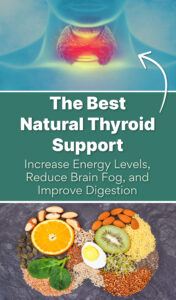How to Naturally Improve Thyroid Function for More Energy, Less Brain Fog, and Better Digestion
Supporting optimal thyroid function is an important part of achieving and maintaining vibrant health and wellness.
is an important part of achieving and maintaining vibrant health and wellness.
Here we will explore a bit about the thyroid in general, causes and symptoms of thyroid imbalance, and how to naturally improve thyroid function.
Some of the links in this article are affiliate links. This means that if you click the link and subsequently make a purchase on the merchant’s website, we may earn a small commission at absolutely no additional cost to you. All opinions are entirely my own. I have used all products mentioned personally for years.
A Bit About the Thyroid
The thyroid is a butterfly shaped endocrine gland that is located in the front, lower portion of your neck.
The thyroid gland produces 3 main hormones including Triiodothyronine/T3, Thyroxine/T4, and Calcitonin.
These hormones regulate and support many important processes in the body including:
- The metabolic rate at which your body burns calories and coverts food into energy
- Heart rate
- Body temperature
- Digestion and bowel regularity
- Appetite
- Skin health
- Bone health
- Brain development and growth in children
- Nervous system support
T4 is the precursor to the active thyroid hormone, T3. They work together, however T3 is the hormone that actively engages in facilitating most of the above functions.
Calcitonin helps to regulate calcium and phosphate metabolism within the blood.
The thyroid works closely with both the pituitary gland in the brain and the adrenal glands in the upper abdomen.
The pituitary gland signals the thyroid to release more or less hormones by releasing a hormone called Thyroid Stimulating Hormone/TSH.
Thyroid Function Testing
There are 2 main forms of testing that are valuable for evaluating one’s thyroid function, blood testing and Hair Tissue Mineral Analysis/HTMA.
When testing one’s thyroid function via the blood, the following markers are of the most value:
- Thyroid Stimulating Hormone/TSH – this will often be high with low thyroid function and low with overactive thyroid function
- Free T4 – this is the T4 hormone that is not bound to a binding globulin/transport protein, making it the hormone that is usable by the body and henceforth the most valuable form of thyroid hormone to test
- Free T3 – this is the active T3 hormone that is not bound to a binding globulin/transport protein, making it the hormone that is usable by the body and therefore the most valuable form of this thyroid hormone to test
- Thyroid Peroxidase/TPO and Thyroglobulin – antibodies to TPO and thyroglobulin will indicate the presence of autoimmune thyroid imbalance
Typically, one will experience tangible symptoms of low thyroid function if their TSH is at or above 2 mIU/L.
A free T3 value between 3 – 4 pg/dL is usually indicative of normal thyroid hormone production. A free T4 value between 1 – 1.6 ng/dL is usually indicative of normal thyroid hormone production.
Testing can be tricky however, and ranges and units of measurement differ from lab to lab. Thyroid lab results should not be viewed in isolation, as blood results can appear within range when there is indeed a thyroid imbalance present.
Hair Tissue Mineral Analysis/HTMA is another very valuable way of assessing one’s thyroid status. HTMA involves taking a sample of one’s hair and testing the mineral, mineral ratios, and heavy metal levels of the hair.
Hair can be a valuable medium to use because it will display the cell and tissue stores of minerals and heavy metals over approximately a 3 month period of time.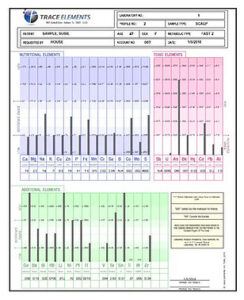
Because our mineral level and mineral ratio patterns are closely linked to our glandular function and more, HTMA can also be used to determine one’s metabolic type, adrenal gland function, thyroid gland function, and blood sugar balance.
HTMA interpretation is a complex skill that must be done by a trained professional.
I recommend Rick Fischer who has been an HTMA practitioner for many years. More on HTMA and the specific services he offers can be found here.

To learn more about the huge significance of minerals and your health, click here to receive a free copy of the Mineral Secrets for Optimal Health ebook!
The Thyroid Adrenal Connection
The thyroid gland and adrenal glands have a direct influence on each other.
The adrenal glands are 2 endocrine glands that are on top of each kidney. They play a big role in the body’s stress response, support the immune system, help regulate blood pressure, and more.
If there is adrenal imbalance present, there is also often thyroid imbalance present and vice versa.
There are several reasons for this.
First, one of the main stress hormones released by the adrenal glands, cortisol, can suppress TSH production if it remains too high for any length of time. This will lower thyroid function because the pituitary gland is telling the thyroid to release less hormone.
Second, chronically high stress levels, which cause adrenal fatigue or insufficiency, will impact the conversion of T4 to T3. This means there is less active thyroid hormone for the body to use.
Third, low thyroid function can result in adrenal fatigue by causing lowered cortisol production.
When addressing thyroid or adrenal imbalance, it is usually worthwhile to consider both of these important endocrine glands and treat them concurrently.
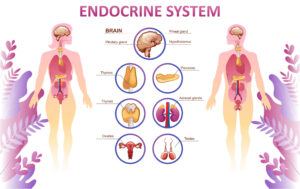
Other Causes of Thyroid Imbalance
There are 2 main ways the thyroid can become imbalanced; it can produce too many hormones, referred to as hyperthyroidism, or produce too little, referred to as hypothyroidism.
Thyroid imbalance can be autoimmune in nature or be caused by other factors such as nutrient deficiencies and other hormone imbalances that affect the thyroid.
Hashimoto’s Thyroiditis is the autoimmune form of hypothyroidism and Grave’s Disease is the autoimmune form of hyperthyroidism. These 2 conditions occur when the body produces antibodies against thyroid cells.
Estrogen dominance, which is a common hormone imbalance that involves a higher estrogen level in relation to progesterone, can contribute to thyroid imbalance as well. This is because high estrogen levels can cause the body to produce more Thyroid Binding Globulin. This is a transport protein the binds T3 and T4 to transport them throughout the body. These hormones are not usable by the body if they are bound, however, so this can cause low thyroid function.
In this case, it is important to note that one may have thyroid blood levels that are within range, yet still present with low thyroid function symptoms. This is because the body is producing enough hormones, but it is unable to use them because of the higher levels of transport proteins being produced.
The thyroid is also particularly sensitive and vulnerable to the effects of systemic inflammation, mineral imbalance such as Copper Toxicity, and chronic stress, all of which can contribute to thyroid imbalance.
Thyroid nodules can also form as a result of thyroid imbalance. These are growths that occur within the thyroid. A goiter can also occur, which can involve a general enlargement of the thyroid gland, or a collection of thyroid nodules that have formed.
The term thyroiditis refers to inflammation of the thyroid gland, which can occur as a result of the above mentioned causes.
In many cases of thyroid imbalance, it is not the thyroid gland itself that is malfunctioning, it is an imbalance elsewhere in the body that is influencing the thyroid. The body is an interconnected whole and all of our organs and systems are connected to each other.

Symptoms of Thyroid Imbalance
Thyroid imbalance can produce many different symptoms which can range from mild to very severe and debilitating.
They can include:
- Chronic fatigue
- Weight gain or weight loss
- Brain fog
- Difficulty concentrating
- Poor memory
- Headaches and migraines
- Irregular heartbeat/heart palpitations/pounding heart
- Menstrual irregularities
- Hair loss (including the eyelashes and eyebrows)
- Straightening of the eyelashes
- Dry, brittle hair
- Dry, flaky skin
- Brittle nails
- Cold hands and/or feet
- Tingling sensation in the hands or fingers
- Blurry vision
- Intolerance to heat or cold
- Low libido
- Difficulty conceiving
- Anxiety
- Depression
- Digestive upset
- Bloating
- Constipation
- Diarrhea
- High cholesterol
- Pain and/or swelling in the neck area
- Adrenal insufficiency
- Muscle cramps, aches, and weakness
- Joint pain
- More

How to Naturally Improve Thyroid Function
There are a variety of ways to naturally support the thyroid gland which include:
-
Diet
One of the best ways to support our health in general is through a healthy, whole food eating plan. A healthy diet supports all of our organs and systems, including the thyroid.
Each individual’s eating plan will differ depending on their unique bioindividual needs, however these dietary guidelines can usually be followed by most people:
-
- Plenty of fresh, whole foods including an array of produce, good quality fats, and good quality proteins
- Low amounts of processed foods
- Low sugar
It is helpful for the thyroid to avoid inflammatory foods such as dairy, gluten, and sugar.
Eating foods that contain the specific nutrients that the thyroid uses to make and synthesize thyroid hormones is also helpful. These nutrients include iodine, selenium, vitamin A, zinc, and magnesium.
The following foods are good sources of these nutrients:
-
- Iodine: seaweed/kelp, eggs, beef, poultry, fish
- Selenium: brazil nuts, eggs, beef, poultry, fish
- Brazil nuts contain very high levels of selenium so one should avoid eating them in excess so as to maintain balance
- Vitamin A: fish, eggs, and other animal proteins
- These are sources of preformed vitamin A, which is the active form of this vitamin that is usable by the body
- Zinc: beef, poultry, fish, eggs, beans, nuts & seeds, beet greens, kale, asparagus
- Magnesium: nuts & seeds, spinach, kale, broccoli, carrots, quinoa, avocado, beef, poultry, fish

-
Lifestyle
Building and maintaining a healthy lifestyle is key to achieving and maintaining optimal health. Various lifestyle factors can also help to support thyroid health.
Making sure that the air in your living environment is cleansed and pure is key to support overall wellness, reduce systemic inflammation, and support immune health, all of which have a positive influence on thyroid health. Using a top quality air purifier is one of the best ways to cleanse your indoor air.
Furthermore, drinking clean, filtered water that is free of contaminants (such as heavy metals, fluoride, and microorganisms) is also a necessary lifestyle factor to support overall health, including thyroid health. These contaminants can directly interfere with your body’s ability to make thyroid hormones.
This portable, affordable filter removes over 99.99% of over 200 water contaminants to ensure that your water is of optimal quality.
Using natural cleaning products and natural personal care products is also essential, so as to reduce your exposure to toxic synthetic chemicals, xenoestrogens, and endocrine disruptors all of which can have a negative effect on the thyroid.
Reducing stress is also extremely important for living a healthy lifestyle and also supporting thyroid health.
Practicing self-love, addressing possible trauma, and utilizing natural stress supporting agents are all excellent ways to reduce chronic stress levels.
Regular exercise is also a key factor in living a healthy lifestyle. Note that your activity level must always coincide with the unique stage of healing that you are in. When experiencing severe chronic illness, exercise is often not possible to any considerable degree. As you reach new and improved levels in your healing journey, your ability to be active will increase.
Click here for more on how to build a healthy lifestyle.

-
Supplements
-
-
Dr. Jockers Thyroid Strong
-
One of the best natural thyroid support supplements I’ve ever used is Dr. Jockers Thyroid Strong.
This supplement contains the following thyroid supporting ingredients:
-
-
- Iodine From Kelp
-
Iodine is vital for proper thyroid function, as it is used to make the T3 and T4 hormones. The body does not produce iodine on its own, meaning all iodine must be acquired via diet and/or supplementation. Kelp is a superior source of iodine.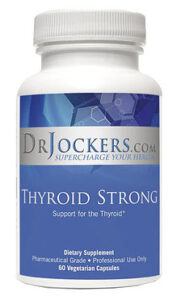
-
-
- Selenium
-
Selenium is needed to convert T4 into active T3 and it also protects the thyroid from damage. Selenium can help to reduce thyroid antibodies as well.
-
-
- Dulse
-
Dulse is a plant that is a natural source of iodine, which is essential for thyroid hormone production.
-
-
- Bovine Thyroid Glandular
-
Glanduars are used to support our endocrine glands, as the body will use these substances as a form of nourishment and they help to encourage the normal functioning of these glands within the body. Thyroid glandulars support optimal thyroid function.
-
-
- Bovine Adrenal Glandular
-
As discussed above, the adrenal glands impact the thyroid gland, and supporting adrenal health via the use of an adrenal glandular has a positive influence on thyroid function.
-
-
- Bovine Pituitary Glandular
-
Pituitary glandular helps to support pituitary function and balance the release of Thyroid Stimulating Hormone/TSH.
-
-
- Bovine Spleen Glandular
-
Spleen glandular can support optimal spleen function, which is an organ that supports immune system function. Optimal immune system function has a positive influence on the function of the thyroid.
-
-
- Bovine Thymus Glandular
-
Thymus glandular can support optimal thymus gland function, which is an endocrine gland that also supports the immune system. Optimal immune system function has a positive influence on thyroid health.
-
-
- Irish Moss
-
Along with kelp and dulse, irish moss is also a natural source of iodine which is essential for thyroid hormone production.
-
-
- L-Tyrosine
-
L-tyrosine is an amino acid that plays a role in thyroid hormone production.
-
-
- Bladderwrack
-
Bladderwrack is also a natural source of iodine. It is also an antioxidant and has anti-inflammatory properties, both of which benefit thyroid health.
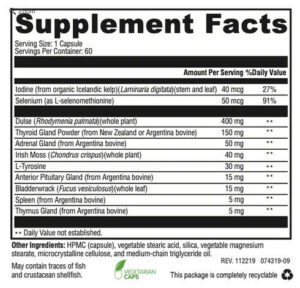
Dosing: amounts per dose are always individualized, yet the standard dose for this supplement is 1 capsule per day on an empty stomach.
This supplement is GMO-free and is also free of all common allergens including gluten, corn, yeast, soy, and dairy.
Click here to check out Dr. Jockers Thyroid Strong.

-
-
Seeking Health Ashwagandha
-
Seeking Health is a top quality line of supplements that I’ve been using for years.
Seeking Health Ashwagandha root extract is an excellent source of this adaptogenic, endocrine supporting medicinal herb.
Ashwagandha is an adaptogen, which means that it helps the body to adapt to physical and emotional stress. This is incredibly beneficial for the body, as chronically high stress levels have a notably adverse impact on our health in many ways.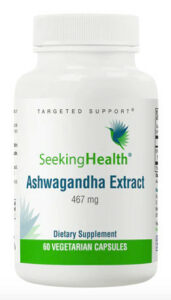
Ashwagandha can help to balance cortisol levels, which can help to support normal Thyroid Stimulating Hormone/TSH production, as discussed above. It can also help to reduce inflammation, which has a positive influence on thyroid health.
Supporting the stress response can also help the body convert T4 to T3 more efficiently.
This herb also helps to balance blood sugar and supports a calm and positive mood.
Ashwagandha can also help to improve memory and focus, which is helpful for thyroid imbalance in that difficulty concentrating and poor memory are common symptoms of thyroid dysfunction.
Dosing: amounts are always individualized, yet the standard dose for this supplement is 1 capsule daily with or without food.
This supplement is GMO-free and is also free of all common allergens including gluten, corn, yeast, soy, and dairy.
Click here to check out Seeking Health Ashwagandha.

-
-
Supplements That Support Bile Production and Flow
-
Bile is a fluid that is made in the liver and stored in the gallbladder. It plays many important roles in the body including supporting detoxification, digestion, immune system function, and hormone balance.
Sufficient bile production and flow is needed in order to convert T4 into active T3. When bile is breaking down dietary fat, an enzyme is released that helps with this conversion.
Click here to learn more about bile and my top recommendations for natural bile production support.
In Closing…
As we’ve explored here, the thyroid plays many significant roles within the body and its proper functioning can be negatively influenced by many common factors such as chronic stress, exposure to toxins, nutrient deficiences, and more.
Utilizing natural thyroid supports such as those discussed here is a wonderful way to nourish this important endocrine gland, which has a tremendously positive influence on one’s health and wellness.
